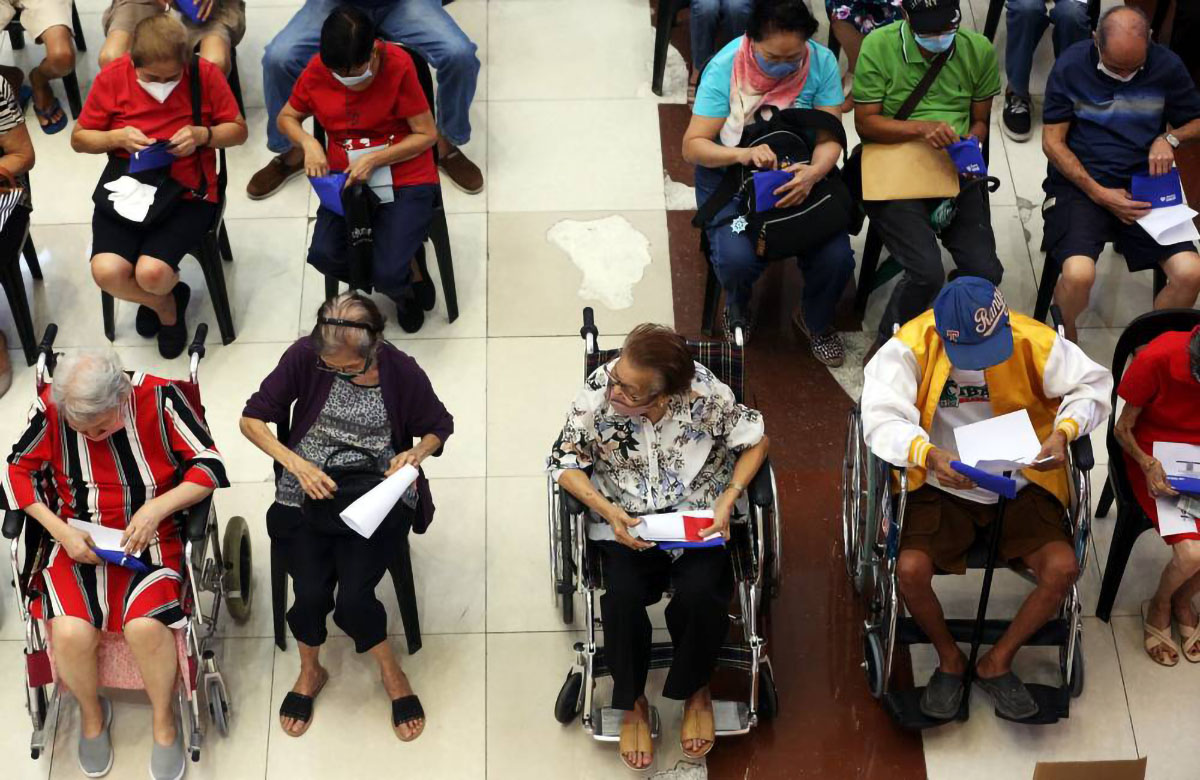High-risk groups warned vs new COVID variants

CAUSE FOR CONCERN While the new “FLiRT” variants may cause “self-limiting and mild” symptoms, these may become severe in at-risk groups, including senior citizens and the immunocompromised, according to infectious disease expert Dr. Rontgene Solante. —INQUIRER FILE PHOTO
Despite an assurance from the Department of Health (DOH) that all regions nationwide remain at low risk for COVID-19 amid the appearance of new variants, an infectious disease expert on Thursday urged vulnerable populations, especially the elderly and immunocompromised, to take precautions to reduce their risk of contracting severe COVID-19.
But Dr. Rontgene Solante, president of the Philippine College of Physicians, the umbrella organization of internists in the country, said the public should not be alarmed over the recent rise in cases.
According to him, the cases due to the new “FLiRT” variants in other countries were not as bad as those traced to the Alpha and Delta variants in 2020 and 2021. FLiRT refers to a whole family of new variants of the SARS-CoV-2 virus, which have picked up the same set of mutations. There are three new variants under monitoring by the World Health Organization (WHO) named JN.1.18, KP.2 and KP.3. All three are descendants of JN.1, an offshoot of the Omicron variant.
Very low immunity
Quoting the WHO, the DOH said there was no evidence for now that the KP.2 and KP.3 variants were causing severe to critical cases in the country or abroad. While the new variants cause “self-limiting and mild” symptoms where patients, in general, will recover without taking any medicine, Filipinos should take precautions as these mild symptoms may become severe in senior citizens and the immunocompromised.
“There is a tendency that these vulnerable populations may get severe COVID-19. And that’s what we are experiencing in hospitals right now. They have a very weak immune response; their bodies cannot fight off these low-risk types of variants,” Solante said
Previous vaccines ineffective
He explained that the previous COVID-19 vaccines given to Filipinos—generally two doses and a single-shot booster—were not as effective against the new strains, including the FLiRT variant.
“It is just unfortunate that because of the mutations, we are no longer protected against these new variants from the previous COVID-19 shots we received. In fact, there are reformulated and updated vaccines available in the market abroad already, but these are not currently available in the Philippines,” Solante said.
As a precaution, he urged the public, especially the elderly, to consult a doctor if their symptoms do not subside in a few days.
“They have to be immediately checked [to see] if they will need treatment or be admitted. Because, in our current experience, those who are usually admitted to the hospitals were already late. They already had a fever for a few days and developed complications, including pneumonia,” Solante said.
He also echoed the call of the DOH for people to properly wear face masks, especially when they go to public or enclosed spaces with a large crowd.
The DOH earlier said that while it was possible the FLiRT variants were already in the country, it was not recommending the return of mandatory mask-wearing or travel restrictions as the hospital utilization rate for COVID-19 cases “was still very low.”
Zero budget
The DOH, in October 2022, when the Omicron subvariants were detected in the country, stressed that the vaccines given to the general population “remain effective in preventing severe and critical Covid-19, as well as death from Covid-19, regardless of variant.”
The last booster shots were given last year, but only to select priority groups. In 2023, the DOH distributed 390,000 shots of bivalent vaccines donated by the government of Lithuania to healthcare workers and senior citizens. These shots offer additional protection to Omicron subvariants, BA. 4 and BA. 5.
The DOH has zero budget to procure Covid-19 vaccines for this year, including the recommended monovalent XBB.1.5 vaccine to protect against latest Covid-19 strains.
Instead, the agency was relying on donations, including a million doses from Gavi Vaccine Alliance, of which a first tranche of 500,000 was set to arrive within the second quarter of the year.
The emergency use authorizations issued by the Food and Drug Administration on the nine Covid-19 vaccine variants given to the general population since 2021 are set to lapse in July this year — a year after President Ferdinand Marcos Jr. lifted the state of public health emergency in the country due to Covid-19.
In April, the WHO recommended the use of a monovalent JN.1 lineage antigen in creating vaccines.
The WHO noted that the current monovalent XBB.1.5 formulation can still offer protection against the new Covid-19 variants, but only to early JN.1 descendent lineages.
“However, it is expected that the ability for XBB.1.5 vaccination to protect against symptomatic disease may be less robust as SARS-CoV-2 evolution continues from JN.1,” it said.
For more news about the novel coronavirus click here.
What you need to know about Coronavirus.
For more information on COVID-19, call the DOH Hotline: (02) 86517800 local 1149/1150.
The Inquirer Foundation supports our healthcare frontliners and is still accepting cash donations to be deposited at Banco de Oro (BDO) current account #007960018860 or donate through PayMaya using this link.